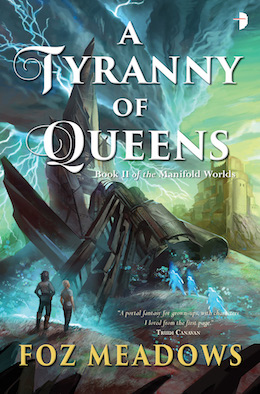Foz Meadows has been nominated for a Fan Writer Hugo Award more than once. Her commentary on genre and media is frequently astute and pointed, not to mention exceptionally readable. She brought some of the same skills to her first novel out of Angry Robot Books, last year’s An Accident of Stars. A Tyranny of Queens is An Accident of Stars’ sequel, and: wow.
An Accident of Stars is one of those books that engaged me so deeply on an emotional level that it short-circuited my critical faculties. Intellectually, at this remove, I can see that it has flaws—it could, for one thing, be a little more smoothly paced—but it is so full of amazing characters and cool shit and themes that matter to me that I don’t care. I love it.
I may love A Tyranny of Queens even more.
After the trauma and upheaval at the close of An Accident of Stars, Saffron Coulter—Safi—has fled back to Earth, where she has had to lie to explain her absence and her scars. In Kena, Gwen and her son Louis are dealing with the aftermath of political upheaval: the Vex (roughly equivalent to a king), Leoden, has fled from the revolt that faced him through a gate between worlds, and Gwen and Louis are working with the next potential rulers to sort out the mess that’s been left on their hands. Meanwhile, in Veksh—another nation in the same world as Kena—Yena, Safi’s girlfriend, is mourning the loss of her adoptive sister, Zech, and navigating the politics of Vekshi society and religion in order to claim the power and influence she might have as the sister of a dead queen. (And missing her girlfriend.)
That’s where things start.
An Accident of Stars interrogated, to greater and lesser degrees of success, the idea of the portal fantasy. Traditional portal fantasy assumes the centrality of the viewpoint of the Earth-character, the correctness of their assumptions, and the centrality of their worldview. An Accident of Stars complicated and undercut all of that with respect to Safi, newly-come to Kena, and Gwen, who found Kena in the 1980s and felt safer there than on Earth.
A Tyranny of Queens does not interrogate the idea of portal fantasy in the same way, but it continues to interrogate the colonialism and imperialism so often inherent in the form, while deepening its thematic concern with history and narrative—with, to borrow a phrase from Hamilton, “who lives, who dies, who tells your story.” This concern with story is given form in the person of Louis, a member of an order which has a mystico-religious approach to Story in the world.
But we can also see it at work in the mirrored narratives of Safi and Yena. Safi has returned to Australia and to school, with its thousand petty cruelties. Scarred and changed, she returns to her world with a sense of estrangement, and a much greater ability to articulate her own self-worth. But the story she has told to explain her scars and the length of her absence comes up against the boxes her world wants to put her in, and she is ultimately unwilling to pretend not to be angry at the thousand small injustices to which she is subject, as a girl in school and a minor whose parents want to “fix” her back the way she used to be. (The scenes with Safi in school are some of the most affecting scenes I have ever read. At points I wanted to cheer.) The competing narratives that people have about Safi conflict with how Safi knows herself to be.
Meanwhile, in Veksh, Yena is negotiating the narrative that the priesthood of Ashasa wants to impose on her. She changed her body to a woman’s form with Kenan magic, not in the sight of the Vekshi goddess, and now in order to claim her rights within the Vekshi system, she must follow the rules for a penitent. (Even if she does not, particularly, repent anything.)
As A Tyranny of Queens progresses, Safi flees her parents’ desire to confine her in an institution and finds her way to yet another world, where she discovers that the history of Vex Leoden that she knows is not the whole history—by meeting the man himself. In Kena, Gwen is coming reluctantly to a similar conclusion, while in Veksh, Yena comes to the dawning realisation that the history the Vekshi tell themselves is, at best, incomplete. This matters more than anyone except Kadeja, an outcaste Vekshi priestess and Leoden’s spouse, has realised. Kadeja is a criminal and a murderer, and she may yet be worse: all her plans were aiming at something that our heroes eventually discover.
A Tyranny of Queens has stronger pacing that An Accident of Stars, and plays the developing strands of its narrative off against each other in ways that heighten tension and highlight the differences—and the similarities—between the characters’ concerns. The characterisation is fantastic. The conclusion is nerve-biting and explosive—and has dragons.
My only complaint is that I wanted more time with each of the characters, and more exploration of their various worlds, and histories. But I might be too closely emotionally engaged with this novel to see it clearly—did I mention that I love it?
I really really love it.
A Tyranny of Queens is available from Angry Robot Books.
Liz Bourke is a cranky queer person who reads books. She holds a Ph.D in Classics from Trinity College, Dublin. Find her at her blog. Or her Twitter. She supports the work of the Irish Refugee Council and the Abortion Rights Campaign. She supposes she should note that she counts Foz Meadows as a friend.










